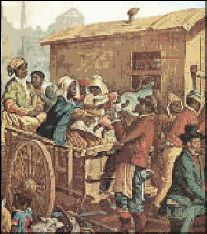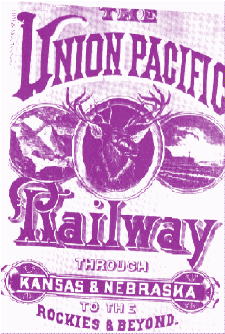|
The
Cost Was High
Families Indentured their Children, Sold Their Property
Although most
colonists came looking for economic opportunity, many could not afford the passage and
arrived as indentured servants with signed contracts to
work for others (sponsors) for a period of four to seven years to repay the cost of their
ocean voyage. The sponsor paid for travel, then provided food/clothing/shelter, and
sometimes small wages to the servant. Indentured women often took care of children, cooked
and did housework, while men worked on farms, in mines, at lumbering and other kinds of
heavy labor. Boys often worked as helpers to craftsmen.
Indenturing people as servants
and/or apprentices was a common practice throughout the world, including the U.S. and
Shelby County, Ohio. It was a way for parents to ensure a future for their children,
encouraging them to learn a skilled craft through indentured service, or for an orphan to
receive foster care, a forerunner to today’s social programs.
Other immigrants sold all their real and personal property, using family savings and
inheritances. Some borrowed against the value of a future inheritance. The average price
of passage mentioned in autobiographies of early Ft. Loramie settlers ranged from $22 to
$30. [At that time, wages were as low as $.50 a week for unskilled, indentured labor to
$6 a week for craftsmen and skilled builders].
Africans first arrived from West Africa involuntarily as indentured servants and later
as slaves. Many of these blacks were
captives of West African tribal wars who were sold to white slave traders in exchange for
European goods. They came over on ships where they were wedged into holds so tightly that
they could barely move. In 1808, Congress passed a law making it illegal to bring slaves
into the United States.
Samuel Gompers, an English Jew, came to the
United States in the 1860s. In the 1925 book, "Seventy Years of Life and Labor,"
he tells about the years in London prior to the American Civil War. "It became harder and harder to
get along as our family increased and expenses grew. London seemed to offer no response to
our efforts toward betterment.
About this time we began to hear more and more about the
United States. The great struggle a gainst human slavery which was convulsing in America was
of vital interest to wage-earners who were everywhere struggling for industrial
opportunity and freedom. gainst human slavery which was convulsing in America was
of vital interest to wage-earners who were everywhere struggling for industrial
opportunity and freedom.
My work in the cigar factory gave me a chance to hear the men discuss this issue.
Youngster that I was, I was absorbed in listening to this talk and made my little
contribution by singing with all the feeling in my little heart the popular songs,
"The Slave Ship" and "To the West, To the West, To the Land of the
Free." It was typical of the feeling among English wage-earners of my boyhood days
that the two most popular songs were "The Slave Ship" and "To the
West." I learned both and sang them with a fervor in which all my feelings quivered
and throbbed. I could throw back my head and sing:
To the
west, to the west, to the land of the free
Where the mighty Missouri rolls down to the sea;
Where a man is a man if he’s willing to toil,
And the humblest may gather the fruits of the soil.
Where children are blessings and he who hath most
Has aid for his fortune and riches to boast.
Where the young may exult and the aged may rest,
Away, far away, to the land of the west.
The song expressed my feeling of America and my desire
to go there rose with the ringing chorus:
Away! far
away, let us hope for the best
And build up a home in the land of the west.
Samuel Gompers became the long-time leader of the American
Federation of Labor.
It is reasonable to believe that the same songs that inspired Gompers to come to
America in the 1860s, may have also inspired some of the immigrants who finally settled in
Shelby County, Ohio.
'Immigration'
segment written in November, 1997 by David
Lodge
[ Back to Immigration Index ]
|

